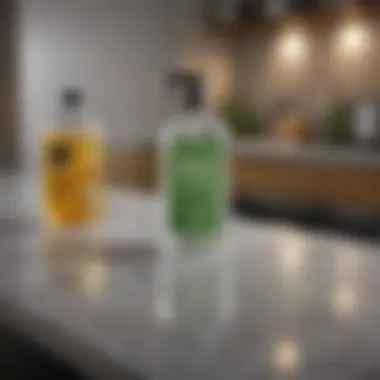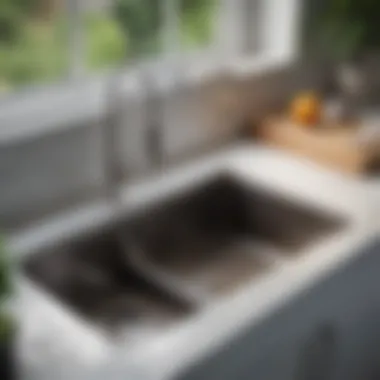Effective Solutions for Hard Water Stain Removal


Intro
Hard water stains are more than just a cleaning nuisance; they signify an underlying issue with water quality. This problem arises in homes with hard water, which contains high levels of minerals like calcium and magnesium. Over time, these minerals can accumulate on surfaces, leading to unsightly blemishes that are tough to remove. Understanding the nature of these stains is the first step in effectively combating them.
Recognizing the importance of effective stain removal, this article lays out a detailed exploration of solutions tailored to address hard water stains. By looking at various methods and products, alongside eco-friendly options, the goal is to guide homeowners in making choices that fit their specific needs. Such knowledge not only enhances cleanliness but also uplifts the overall aesthetic appeal of any space affected by these stains. This guide extends beyond just removal techniques; it provides a comprehensive approach to maintaining a stain-free environment.
In essence, a thorough investigation into hard water stain removal empowers readers, allowing them to take actionable steps for their cleaning challenges.
Understanding Hard Water Stains
Understanding hard water stains is essential for effective cleaning and maintenance. Ignoring this topic can lead to repeated cleaning efforts and disappointment as hard water stains tend to resist common cleaning methods. Knowing the source of these stains, along with their formation mechanisms, empowers homeowners to choose the correct treatment. This understanding enhances the effectiveness of cleaning products and methods they employ. Moreover, recognizing common locations of hard water stains helps in regular maintenance, reducing the build-up over time.
What is Hard Water?
Hard water contains high levels of minerals, primarily calcium and magnesium. As water travels through the ground, it absorbs these minerals, resulting in what is termed hard water. This water is commonly found in many households. Its hardness is measured by the concentration of these minerals. Water hardness can range from slightly hard to very hard, affecting not only cleaning results but also plumbing systems and appliances.
Formation of Hard Water Stains
Hard water stains form when water evaporates from surfaces, leaving behind mineral deposits. These deposits appear as white or cloudy spots, often seen on faucets, showerheads, and glass shower doors. Over time, these stains can build up, making surfaces appear dull and dirty. Stains may also become more challenging to remove as they age. The longer they remain, the more effort it takes to eliminate them.
Common Locations of Hard Water Stains
Hard water stains can appear in a variety of locations around the home. Some of the most common areas include:
- Bathroom Fixtures: Faucets, showerheads, and sinks often show noticeable hard water stains.
- Glass Shower Doors: These can become cloudy and discolored, impacting aesthetics.
- Tiles and Grout: Hard water can deposit minerals on tiled surfaces, making grout lines appear dingy.
- Kitchen Sinks: Areas around the sink often collect stains from constant exposure to water.
- Dishwashers: The interior may have spots from hard water, affecting dish cleanliness.
Recognizing these locations enables proactive cleaning measures, leading to easier maintenance and a cleaner home.
Types of Products Available
Understanding the types of products available for hard water stain removal is essential for any homeowner. Different products cater to various needs and preferences. This section will detail commercial cleaners, natural remedies, and homemade solutions, emphasizing their effectiveness and suitability for specific situations. Evaluating these options informs the reader's decision-making process, helping them choose the right method for their home.
Commercial Cleaners
Commercial cleaners are widely available and specifically designed to tackle hard water stains. These products often contain potent chemicals that break down mineral deposits quickly. They can be effective for people seeking immediate results without the hassle of mixing solutions. Popular brands include CLR and Lime-A-Way. Both brands offer formulations that target calcium, lime scale, and other mineral stains.
While commercial cleaners can be effective, they do come with some considerations. Safety is paramount. When using these cleaners, wear gloves and ensure proper ventilation. Read the instructions carefully, as each product may have specific application methods.
Benefits of using commercial cleaners include:
- Speed: They typically work faster than natural alternatives.
- Targeted Formulas: Many are designed for specific surfaces like glass or porcelain.
- Convenience: Easy to purchase and typically ready to use.
However, frequent use can lead to chemical exposure. Consider these products if quick action is required, but remember to follow safety guidelines for best results.
Natural Remedies
Natural remedies for removing hard water stains offer an eco-friendly alternative. These solutions usually involve common household items like vinegar, baking soda, and lemon juice. Each offers a gentle yet effective approach to stain removal without harsh chemicals.
For instance, vinegar contains acetic acid, which effectively dissolves mineral deposits. When mixed with baking soda, it creates a fizzy reaction that can lift stains easily. Lemon juice, with its citric acid, can be similarly effective. Applying these substances directly to stained areas can provide satisfying results, especially with routine use.
Benefits of natural remedies include:
- Safety: Fewer chemicals mean a lower risk of health hazards.
- Cost-Effective: These ingredients are often inexpensive and readily available.
- Environmentally Friendly: They have a lower impact on the environment compared to many commercial products.
Natural remedies can be slower than commercial products, but they are often more suitable for regular maintenance without damaging surfaces.
Homemade Solutions
Homemade solutions allow users to customize their approaches to hard water stains. These options can be built from combinations of natural and commercial products, depending on needs and preferences. A simple but effective homemade cleaner may consist of equal parts water and vinegar, with added baking soda for extra power.
Mixing ingredients can yield diverse outcomes. For example, combining salt with lemon juice creates a paste that can be scrubbed on stubborn stains. The texture assists in gentle scrubbing while the acid helps in breaking down deposits.
Benefits of homemade solutions include:
- Customization: Users can create solutions tailored to their specific needs.
- Control Over Ingredients: Know exactly what's in your cleaning products.
- Satisfaction: Creating your cleaning solution can be empowering.


Making and using these solutions is accessible, providing a practical approach for those wishing to avoid commercial cleaners. Test a small area before applying broadly, ensuring no surface damage occurs.
In summary, evaluating each product type, whether commercial cleaners, natural remedies, or homemade solutions, can enhance your cleaning experience. Each approach has strengths and weaknesses, influenced by priorities like effectiveness, environmental impact, and safety. Choosing the best option will lead to more effective stain removal and a healthier living environment.
Evaluating Product Effectiveness
In any endeavor to tackle hard water stains effectively, it is essential to evaluate the product's effectiveness deeply. This critical phase is not merely about selecting a cleaner but involves a thorough assessment of various facets that contribute to successful stain removal. Understanding how well a product performs is pivotal for homeowners who often face relentless stains that can detract from the aesthetic appeal of their fixtures and surfaces. By evaluating product effectiveness, one can make informed choices that save time, effort, and resources.
Several specific elements come into play when assessing how well a product works against hard water stains. The first consideration is the ingredients within the cleaning solution. Different formulations can produce varying results. Furthermore, understanding the application methods linked with these products can also sway their overall effectiveness.
Another vital aspect is analyzing consumer reviews and ratings. Users often provide insights about their real-world experiences with the products. This feedback can highlight patterns in performance that might not be apparent from the product descriptions alone. Additionally, considering effectiveness alongside cost is crucial. Just because a cleaner is pricey does not inherently make it superior in performance. By evaluating both together, consumers can arrive at balanced decisions that meet their cleaning needs without overspending.
"The best cleaning products are not about high price but about being the right product for the specific issue at hand."
Through this section, a deeper understanding of product effectiveness will inform readers about the most beneficial choices they can make when facing hard water stains in their homes.
Key Ingredients to Look For
Identifying the right ingredients is crucial for determining which products will effectively combat hard water stains. Several key components can yield significant results when tackling mineral deposits and stains. These include acids, surfactants, and chelating agents.
- Acids: Look for cleaners that include citric acid or acetic acid, which are known for their ability to dissolve mineral deposits.
- Surfactants: These agents help loosen dirt and stains from surfaces, enabling easier removal.
- Chelating Agents: Such as EDTA, help bind minerals in water, preventing them from depositing onto surfaces.
By focusing on products featuring these ingredients, consumers can enhance their chances for successful stain removal.
Consumer Reviews and Ratings
Consumer feedback represents a wealth of information regarding product performance in real-life situations. Engaging with ratings and customer opinions allows individuals to avoid trial and error. It's prudent to seek out products with consistently high ratings from users who have faced challenges with hard water stains.
When reviewing consumer insights, pay attention to specific aspects like:
- Effectiveness: Did the product achieve visible results?
- Ease of Use: Was the product simple to apply?
- Safety: Were there any adverse effects noted in the reviews?
Evaluating a product's reception can significantly guide selection, offering trustworthy insight into what works and what does not.
Comparing Cost vs. Effectiveness
Budget considerations are inherently tied to cleaning product selection. A higher price does not guarantee effectiveness, while cheaper alternatives may disappoint. Therefore, a comparative analysis of cost and performance is fundamental for consumers.
To arrive at informed decisions, consider the following steps:
- Research multiple brands and their price points.
- Look for sales or bulk purchase options to maximize value.
- Weigh the long-term benefits of a more expensive product against frequent purchases of cheaper options.
Application Techniques
The methods used in applying cleaning solutions for hard water stains play a crucial role in achieving effective results. Understanding the necessary application techniques can make the difference between a clean surface and a frustrating cleaning experience. Proper technique not only enhances the effectiveness of the product but also minimizes the risk of damaging the surface being cleaned. In this section, three specific areas will be highlighted: preparing the surface, the step-by-step cleaning process, and post-cleaning maintenance practices.
Preparing the Surface
Before any cleaning product is applied, it is essential to prepare the surface properly. This step lays the groundwork for effective cleaning. Start by removing loose dirt or debris with a dry cloth or broom. This action ensures that no additional particles scratch the surface during the cleaning process.
It is also advisable to assess the type of surface being cleaned. For example, glass and ceramic surfaces are less tolerant of abrasive cleaners than tougher surfaces like granite. After clearing the area, it might be useful to wet the surface lightly. This process helps the cleaning product to adhere better and work more effectively against the hard water stains.
Step-by-Step Cleaning Process
Once the surface is prepared, the actual cleaning can begin. Follow these simplified steps for effective hard water stain removal:
- Select the Right Cleaner: Depending on the severity of the stains, choose a commercial cleaner or a natural solution such as vinegar or baking soda.
- Apply the Cleaner: Use a spray bottle or cloth to apply the cleaning solution evenly over the stained areas. Focus on areas with the most buildup.
- Let It Sit: Allow the solution to sit for 5 to 15 minutes. This waiting time enables the cleaner to penetrate and break down the hard water deposits.
- Scrub Gently: Use a soft sponge or cloth to scrub the stained areas. Avoid using steel wool or harsh brushes that can scratch the surface.
- Rinse Thoroughly: After scrubbing, rinse the area with clean water to remove any residual cleaning solution and loosened stains.
- Dry the Surface: Use a clean, dry cloth to wipe down the surface. This step is vital to prevent new water spots from forming.
By adhering to this structured cleaning process, one can enhance the likelihood of completely removing hard water stains.
Post-Cleaning Maintenance
The work doesn't end once the stains are removed. Implementing a post-cleaning maintenance routine is vital for prolonging the cleanliness achieved. Here are some strategies for maintaining a stain-free surface:
- Regular Cleaning Schedule: Establish a consistent cleaning routine to prevent hard water stains from returning. Depending on the area, weekly or bi-weekly cleanings are often sufficient.
- Use a Squeegee: After bathing or showering, using a squeegee on shower doors and tiles can substantially reduce water deposits.
- Dry Surfaces Post Use: Encourage household members or guests to dry surfaces after using them. This importantly lowers the chances of hard water stains accumulating.
- Apply Sealants: Consider applying a sealant on porous surfaces to create a barrier against water accumulation. This measure might be especially useful on tiles and stone countertops.


Regular post-cleaning maintenance can save time and effort in the long run while ensuring a consistently clean environment.
By understanding and applying effective cleaning techniques, homeowners can not only deal with existing stains but also prevent them in the future. In the next sections, further insights into eco-friendly cleaning options and preventing future stains will be explored.
Eco-Friendly Cleaning Options
The growing awareness around environmental sustainability has brought the spotlight on eco-friendly cleaning options, particularly in the realm of hard water stain removal. In this section, we will explore the significance of adopting green alternatives when tackling the issue of hard water stains, focusing on their benefits, popular products, and DIY solutions. The use of eco-friendly cleaners not only helps in maintaining a safe home but also contributes positively to our planet’s health.
Benefits of Green Cleaners
Eco-friendly cleaners offer several advantages that make them a compelling choice for homeowners.
- Healthier Indoor Environment: Many commercial cleaning solutions contain harsh chemicals that can compromise air quality and pose health risks. Green cleaners typically use natural ingredients, reducing the likelihood of respiratory issues or skin irritation.
- Biodegradability: Unlike chemical-based products, eco-friendly cleaners often break down naturally, avoiding harmful effects on local ecosystems. Their composition ensures they don’t linger in the environment, which is beneficial for waterways and wildlife.
- Safety for Pets and Children: Using green cleaners minimizes the chances of accidents, such as poisoning or allergic reactions, making them the ideal choice for households with young children or pets.
Choosing products with non-toxic labels is essential for creating a safer home environment.
- Effectiveness: Though some may question the power of eco-friendly solutions, many are designed to specifically combat tough stains. They can be potent against hard water deposits while remaining gentle on surfaces.
Popular Eco-Friendly Products
There are various eco-friendly cleaning products available that effectively treat hard water stains. Some notable options include:
- Seventh Generation Dish Liquid: This plant-based cleaner works well on glass and ceramic surfaces, making it useful for removing hard water deposits.
- Green Works All-Purpose Cleaner: This product is effective for many surfaces and is formulated with plant-based ingredients, providing a safe cleaning option.
- Method Glass Cleaner: Designed for glass surfaces, this cleaner uses natural ingredients to remove hard water stains without streaks.
- Martha Stewart Clean All-Purpose Cleaner: Offers a biodegradable formula that addresses stains efficiently while being safe for both the home and environment.
These products can often be found in supermarkets or online, catering to different cleaning needs without compromising safety.
DIY Eco-Friendly Solutions
Creating your cleaning solutions can be as simple as combining a few common household items. Here are some effective DIY recipes:
- Vinegar and Water Solution: Mix equal parts of white vinegar and water in a spray bottle. Spray directly onto stained surfaces, let it sit for a few minutes, then wipe clean with a cloth.
- Baking Soda Paste: Combine baking soda with a small amount of water to create a paste. Apply it on tough stains, allow it to sit for 10-15 minutes, and scrub gently before rinsing with water. It acts as a mild abrasive, ideal for removing tough deposits.
- Lemon Juice: The acidic nature of lemon juice helps break down minerals found in hard water. Apply fresh lemon juice to affected areas, leave it for a few minutes, and wipe down with a clean cloth.
This method also leaves a fresh scent, enhancing the cleaning experience.
Opting for these eco-friendly solutions can lead to effective hard water stain removal while ensuring that your cleaning practices are respectful of the environment.
Preventing Future Stains
Preventing hard water stains is crucial for maintaining the aesthetic appeal of your surfaces and prolonging their lifespan. Addressing this issue proactively saves time and reduces the frequency of deep cleanings. Understanding and implementing effective measures can transform how you manage water usage at home.
Water Softening Systems
Water softening systems are often the first line of defense against hard water stains. These systems work by removing calcium and magnesium ions from the water, which are primarily responsible for leaving stubborn deposits. The most common method is ion-exchange, where hard water passes through a resin that exchanges these minerals for sodium ions.
Investing in a quality water softening system not only prevents stains but also benefits plumbing appliances. Softened water reduces scale buildup in pipes, which can enhance water flow and efficiency. Homeowners may find various types of systems, including salt-based softeners, which are effective but require regular salt replenishment, and salt-free alternatives, which are less maintenance-intensive but may be less effective at stain prevention.
Regular Maintenance Routines
Incorporating a regular maintenance routine can significantly reduce the risk of future hard water stains. Establishing a cleaning schedule ensures that surfaces remain clean and prevents mineral buildup. Simply wiping down faucets, showerheads, and tiles every week can make a difference.
Key maintenance tasks include:
- Wiping surfaces dry after use to reduce moisture.
- Using mild vinegar solutions to disperse existing deposits without harsh chemicals.
- Inspecting plumbing for leaks that might contribute to excess water accumulation.
This consistent attention can create a barrier against accumulating stains and save you time and energy in the long run.
Strategic Cleaning Schedules
Setting strategic cleaning schedules adapts to the specific needs of your environment. Factors like water hardness, humidity, and usage frequency all contribute to stain formation. Designating specific tasks for different days can streamline your efforts.
Some tips for an effective cleaning schedule are:
- Weekly Spot Checks: Identify and clean any areas that show signs of staining.
- Monthly Deep Cleaning: Dedicate time to deeper cleans with effective products designed for hard water stains.
- Seasonal Maintenance: Consider seasonality in your approach to cleaning, as winter may lead to increased indoor activities that can result in more stains.
By understanding water conditions and patterns in your home, you can effectively plan your cleaning to minimize the impact of hard water stains.


Addressing Common Misconceptions
When it comes to hard water stains, several myths and misinterpretations can lead to ineffective cleaning practices. Addressing these misconceptions is crucial for empowering homeowners to make informed decisions. Understanding the truth behind hard water helps in selecting the right products and techniques while avoiding unnecessary use of harsh chemicals.
Myths About Hard Water
Several myths surround the concept of hard water. One prevalent myth is that hard water itself is harmful to health. In reality, hard water comes from natural mineral deposits and contains calcium and magnesium, which can actually be beneficial. However, this does not mean it is free from other potential contaminants.
Another common misconception is that hard water stains can be cleaned effortlessly using any household cleaner. This is misleading. Not all cleaners are created for the specific task of removing tough mineral deposits. Specialized products are often necessary to effectively tackle these stains without causing damage to surfaces.
Misunderstandings About Cleaning Products
Many believe that expensive commercial cleaning products are the only viable solution for hard water stains. This belief ignores the effectiveness of natural remedies and homemade solutions. In fact, many household items like vinegar and baking soda can break down mineral buildup effectively without the side effects of commercial cleaners.
Furthermore, there is often a misunderstanding regarding the safety of certain cleaning agents. While some products may seem harmless, they may contain phosphates or other chemicals that can harm the environment in the long run. Being informed about the ingredients and their impacts is key.
Reality of Maintenance Efforts
Some homeowners may assume that once they clean hard water stains, they won’t need to do it again for a long time. However, this notion is misleading. Regular maintenance is essential to prevent the buildup of stains. Without consistent attention, stains can reappear more severely, making future cleaning efforts much harder.
Moreover, many underestimate the time and effort required for effective stain removal. It is not merely about applying a cleaner; the surface must be prepared, the right technique applied, and a maintenance routine established. This comprehensive approach is essential for sustained cleanliness.
"Understanding the full picture regarding hard water stains and the correct methods to tackle them can save time and reduce frustration in the long term."
Personal Experiences and Case Studies
Personal experiences and case studies are critical elements in understanding the practical applications of hard water stain removal solutions. They offer real-world insights into how different cleaning products and techniques perform in various environments. Real-life accounts provide invaluable information to homeowners and others facing the persistent problem of hard water stains.
By examining these experiences, readers can identify effective methods that have worked for others. This river of shared knowledge enrichens the article, promoting best practices while also shedding light on common pitfalls that can occur during the cleaning process.
Moreover, personal accounts illustrate the effectiveness of the strategies discussed in this article. They ground recommendations in factual evidence rather than mere theory. This connection provides a credible lens through which readers can view highlight or overlooked aspects of hard water stain removal.
Success Stories
Many individuals have successfully tackled hard water stains with a variety of methods. For instance, a homeowner in Texas experienced severe mineral deposits on their bathroom fixtures. After trying numerous products, they settled on a combination of white vinegar and baking soda. The results were impressive, with visible improvement after just one application.
ul> li>This success story highlights the efficacy of natural remedies over commercial options.li> li>It also encourages others to experiment with similar combinations, showcasing the potential of household items.li> ul>
Similarly, a case study from Reddit reported on a rental property where tenants struggled with hard water stains in the kitchen. By implementing a regular cleaning schedule using citric acid products, they significantly reduced grease and mineral buildup. The tenants noted a shift not only in fixture appearance but also in overall cleanliness. This case signifies the importance of consistent maintenance strategies.
Challenges Encountered
Even the best-laid plans can encounter obstacles. One common challenge involves users applying products incorrectly. A homeowner shared their experience of applying a chemical cleaner unevenly, resulting in streaks on their glass shower door. This led to frustration and required additional cleaning efforts to rectify the error.
Another challenge involved time constraints. A busy individual attempted to use a homemade stain remover on bathroom tiles. However, the lengthy soaking time meant they had to postpone other cleaning activities. This adjustment period illustrates a key consideration: scheduling and preparation are essential for successful application.
Lessons Learned
Throughout these personal experiences, several lessons emerge for effective hard water stain removal.
- Focus on Trial and Error: Experimentation can lead to discovering the most efficient methods for individual situations.
- Consistency Matters: Regular cleaning helps mitigate the intensity of stains, making future efforts less time-consuming.
- Follow Instructions Carefully: Adherence to product guidelines is crucial for achieving optimal results and avoiding frustration.
In summary, personal experiences and case studies greatly enhance the understanding of hard water stain removal. They convey the practical realities of cleaning approaches, providing readers with both inspiration and cautionary tales.
Ending
Summary of Best Practices
To effectively combat hard water stains, several best practices have emerged:
- Regular Cleaning: Implement a consistent cleaning schedule to prevent the build-up of stains. Quick cleaning sessions after each use can significantly reduce the effort later.
- Product Selection: Choose the right cleaning products, whether commercial cleaners or eco-friendly options, based on the material you're treating. Read labels carefully to avoid harmful chemicals.
- Application Technique: Use effective application methods such as microfiber cloths or sponges to enhance cleaning efficiency. Ensure that surfaces are prepped adequately before applying any product.
Final Recommendations
When tackling hard water stains, it is best to:
- Test Before Full Application: Always test any new product in a small, inconspicuous area to avoid damage to surfaces.
- Invest in Water Softeners: Consider installing a water softening system if hard water is a constant issue in your locality.
- Utilize DIY Solutions: Make use of natural ingredients like vinegar or baking soda, which can be effective and safe for many surfaces.
Encouragement for Continuous Maintenance
Continuous maintenance of your home's surfaces is critical in preventing hard water stains. Regular upkeep not only ensures a clean appearance but also extends the lifespan of your fixtures. Homeowners should embrace a proactive approach and allocate time for routine cleaning. Encourage family members to engage in this process to share responsibility, which can foster awareness about the importance of maintaining a stain-free environment.
By integrating these practices into your cleaning routine, you ensure that your spaces remain well-maintained and visually appealing.







